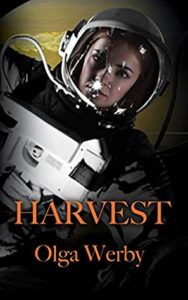As our SPSFC team finishes reading our ten quarterfinalists out of our first round allotment, I will be posting review roundups and official scores. As you read our thoughts on these ten books, keep in mind that we have a variety of tastes on this team, and a low score does not necessarily indicate a bad book. One or two (or even all four!) judges bouncing hard off a book can tank a score and keep it from advancing in this competition, but that doesn’t mean the same book might not be perfect for another reader.
Today, we’ll dive into Olga Werby’s Harvest, a first contact novel featuring a group of science experts seeking to understand an alien society before their ignorance puts them on the wrong side of interplanetary war.

Jay’s Review and Rating
I find a lot to like in Harvest, and there’s a reader out there who loves slow-building, theory-heavy tales with academic leads and messy endings who will click with the prose and end up wondering where this book has been all their life. But on the other hand, slow-building, theory-heavy plots are going to turn off a lot of readers, as will messy endings. And prose, of course, is heavily idiosyncratic. So I wouldn’t be surprised to see this as a hard miss for just as many. Personally, I liked the characters and the theorizing, and I think the ending worked, albeit didn’t wow me, but a partial miss on the prose and atmosphere leave this with just a cautiously positive rating.
Jay has rated Harvest 7/10. For more detail, check out his full review.
Esme’s Review and Rating
I love the idea of studying socio-evolution and the anthropological aspects to this book. The MC is kind of an anthropologist of sorts and it makes for an interesting crossover when you’re trying to explain potential alien motivations. I felt like I wanted more, though. There are certain things I would have expected to have made more of an impact on the world and story.
It took me a long time to warm up to the characters, but I did by the end really enjoy Vars and her dad, Matteo. I found their relationship to be endearing to both of their characters, and it evoked serious emotion from me later on.
I think my biggest issue was with the pacing. There was a lot of time spent on planning, thinking every aspect of something through, and going on long monologues about different scientific theories. Sometimes this can work really, really well for me, but it has to be balanced with forward movement.
All in all I would really recommend this to people who like to explore the ideas of first contact, panspermia, anthropology, space exploration, terraforming, different societal structures and careful planning.
Esme has rated Harvest 7.5/10. For more detail, check out her full review.
Lilyn’s Review and Rating
Harvest works well as a science fiction novel with some believable ‘hard’ elements. While not a gripping page-turner to be finished in one sitting, it is also not a book easily abandoned. There was obviously a lot of thought put into this book and it was one of the more stand-out selections in the Team Tarvolon Self-Published Science Fiction Competition queue.
Lilyn has rated Harvest 7.5/10. For more detail, check out their full review.
Bill’s Review and Rating
Harvest is a novel by Olga Werby, who has a B.A. from Columbia University in Mathematics and Astrophysics and worked at NASA on the Pioneer Venus Project as a programmer. So it should be clear that she has a credible scientific foundation for writing sci-fi. She also lists some specific references she leaned on in her appendix, one of which I can guess, most of which I know, all of which are again credible or authoritative. Oh, and there also is a reference to Malcolm Gladwell.
The basic story elements I won’t touch on beyond what is included in the standard book blurb. The time is about a hundred years in the future, nano-bots are discovered throughout the solar system, and alien contact needs to be investigated. The plot action elements lay out in an interesting manner, with parallel action between the trip to Saturn to investigate the alien artifact and what is happening back on Earth. Oddly enough while the first chapter occurs on Mars we never go back there, I wonder if its a chapter that was written separately and just dropped in after some rough adaptation.
No, the real story of this story is not the story but the prose. The author has taken to heart the advice to show the reader what you want them to experience, don’t just tell them. Don’t have large blocks of text just dumping information at them. No, show them what you want. And one of the best ways to do that is through dialog.
Bill has rated Harvest 3/10.
Official Scores
| Jay | 7 |
| Esme | 7.5 |
| Lilyn | 7.5 |
| Bill | 3 |
| Team | 6.5 |
Status: ELIMINATED IN THE QUARTERFINALS.
